The American City Manager Tlti e City Manager. By Leonard
D. White. (University of Chicago Press, Chicago. Price $3.) MANY Englishmen who have heard of the comparatively new office of City Manager in several American towns must have wondered what the functions of a manager are, how such an office dovetails into ordinary municipal administration, and whether or not the experiment has been a success. In this book Dr. Leonard D. White, Professor of Political Science in the University of Chicago, discusses the whole subject.
Our first and last impression is that the plan would not find British municipalities a friendly soil. There is an undoubted tendency in the United States to concentrate administration from the highest political domain to the lowest. The Director of the Bureau of the Budget keeps a tight hold of the national finance ; Illinois, with its Civil Code, has shown how a State Government may gather power into its hands ; and several Mayors of New York, Philadelphia, and Boston have proved that a strung man who has a liking for autocracy need not be denied. The scheme of City Managers accords with this tendency. It is notorious that there have been too much politics and too much " graft " in American municipalities. So far as the Manager plan is an attempt to purify and to introduce a stricter attention to the business in hand it is all to the good. In Britain, however, it is almost inconceivable that it should be adopted. It is true that politics in this country are more closely linked with municipal affairs than ever before—more's the pity—but this seems to be a disadvan- tage which we must bear, for it is inevitable. The reason is clear. Labour here virtually stands for Socialism. The Socialists would never give any peace to a Manager who repudiated Socialistic aims. such as increased municipal ownership. In the United States, on the other hand, Socialism plays a very small pai-t. Accordingly, when it is proposed there to remove municipal management from the distracting rivalry of political partisans there is no objection that strikes into the very foundation of men's thoughts.
The Manager plan came into being less than twenty years ago and there are now about 400 Managers. How can a Manager and a City Council or even a Manager and a Mayor co-exist ? Dr. White tells us that in some cities the Manager is a despot who gets his way simply by thrusting the Mayor or the Council, or both, into outer darkness. In other cities the Manager scrupulously allows his field of operation to be delimited and the Councillors, who are changed every two or four years, are glad to have an expert who can give practical shape to their wishes and who is the embodiment of a con- tinuous policy. The answer, then, to the question how contra- dictory functions can be reconciled is that some cities get on without reconciling them, and that others do reconcile them, but that the problem has not yet been solved by any infallible formula. Dr. White will not go so far as to say that the Manager plan is a proved success. All he says is that it has done much good in many places and that it is well worth while to continue it.
Take the City Manager of Cleveland as an example of the despot. Dr. White tells us that the Mayor asked for an office in the City Hall, but the Manager opposed this, saying that there was room for only one head of the City. " The Mayor has never had an office in the City Hall since." It is obvious that when the rule of a Manager comes to an end it may be exceedingly difficult to replace him if his personality has superseded the ordinary machinery. This objection seems all the more cogent when we learn that there is a lack of men in America with suitable training to become City Managers.
If the experiment spreads as fast as it seems to be doing at present it will no doubt be necessary to have a regular training ground. Perhaps City Managers will be taught their jobs as surveyors or estate agents or engineers are taught theirs. It is a curious fact that in advertising for a City Manager a Council will very often announce that preference will be given to an engineer. That seems to prove that in most cases it is desired to have an expert in drainage, road and bridge building and so forth, who will be the practical interpreter of the Council's schemes. The charters which legalize the employment of a Manager certainly do not contemplate a despotism. In order to keep " graft " at arm's length most charters stipulate that the Manager shall not be a local man, but we read that the tendency is for this condition to be disregarded.
The typical manager seems to be a hard-driven man. He is accessible to any citizens who call upon him with grievances and suggestions. One can imagine the rush of cranks and busybodies. At a fixed hour every day he " suspends all other duties and meets the City Hall reporters." If he is a normal manager he does not contest the Mayor's right to be the ceremonial head and the public spokesman of the City, nor does he attempt to interfere with education, the Municipal Court, or the Public Library. He is rather the Director of construction, maintenance, and local utilities. On the whole, however, the general effect of the experiment is that the Council is always shorn of some of its importance.
Are there any lessons for us in all this ? The appointment of Commissioners to take the place of the old Dublin Council and the temporary supersession of English Boards of Guardians which have disobeyed the laws are, presumably, exceptional cases. There is, however, a matter in which the example of America may teach us something. All through the scale of Public Assistance grants are made by appointed officials until we come down to the Poor Law, where the Guardians who make grants are elected by the contingent beneficiaries. In country districts the Poor Law system has happened to work very well, but in some of the industrial areas extreme Socialist majorities have wrought havoc. Theoretically Guardians have no power to levy a rate, but in practice they can do so because they run up a bill which the Borough Council has to meet. The only alternative to a system of appointed officials for the distribu- tion of relief seems to be the withdrawal of the power to vote from those who are " on the rates."







































 Previous page
Previous page